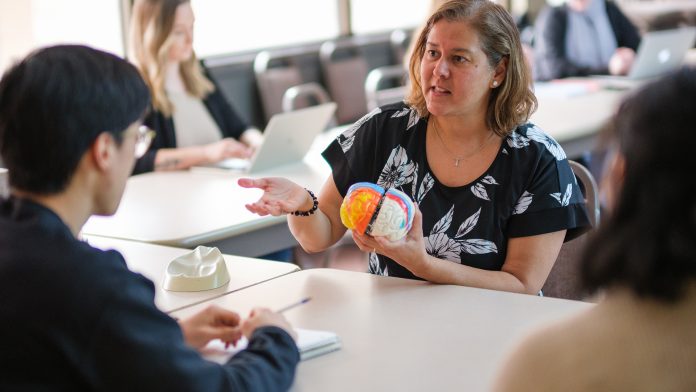The University of Waterloo, Canada’s number one comprehensive research university, is excited to tap into €53bn in new funding opportunities offered by Pillar II of Horizon Europe.
Researchers at the University of Waterloo (Waterloo), Canada’s number one comprehensive research university for the last 16 years, eagerly anticipate the official launch of Canada’s participation in Horizon Europe’s Pillar II programme to further support the university’s globally important and impactful research.
As the latest developed economy to join Horizon Europe under Pillar II, Canada has the opportunity to access €53bn in funding available through the European Commission. Waterloo’s proven track record of research excellence and successful international collaborations ensures that the university is well-positioned to leverage the myriad opportunities offered by this game-changing agreement.
Waterloo’s international reach
Waterloo is committed to advancing learning and knowledge worldwide through teaching, research and scholarship. Through Waterloo International, the university collaborates with other leading institutions around the globe to enhance its expertise further in the areas of research, entrepreneurship, and innovation.
Waterloo recognises the world is changing and that humanity must evolve with it. International collaborations are vital to achieving success in the future.

Global futures
To create maximum global impact, Waterloo is focusing on the following five key areas for humanity where it can leverage its academic and research strengths:
Societal futures
Demographic transformations, increased migration, digitisation, and automation, and shifting geopolitical relations are among the forces transforming society.
Waterloo’s dedication to producing ground-breaking research aims to improve communities worldwide.
Health futures
Waterloo is poised to take a unique leadership position by focusing on its strengths at the intersections of health, society, technology, entrepreneurship, and engaging partners to co-create solutions that advance population health and support the development of more sustainable community-based health systems.
Sustainable futures
While the global climate emergency is the greatest threat to our collective future, Waterloo is also addressing challenges in preserving biodiversity, ensuring clean water for all, and producing enough food for a growing planet.
As a leader in sustainability research and education, Waterloo will build on its strength to help guide society towards a sustainable future.
Technological futures
Waterloo has seen that big data can be harnessed to help governments and organisations make informed decisions and address equity and equality concerns. The world demands that innovators develop technology with greater responsibility and accountability.
As Waterloo continues to lead in technology and innovation in critical areas, it can shape technology to serve society rather than letting technology shape it.
Economic futures
Labour shortages, disruptions to supply chains, and geopolitical and digital threats have demonstrated vulnerabilities and risks inherent in several economies. Waterloo has the foundation to shape innovative ecosystems and develop talent to help create more equitable, resilient, and future-proofed economies.
Already a leader in work-integrated learning, Waterloo will support learning-integrated work to help organisations and individuals keep pace with technology and the changing world of work.
Waterloo excels in research, entrepreneurship, innovation, and work-integrated learning
Waterloo’s Global Futures initiative provides a framework to address the world’s most pressing challenges. Access to Horizon Europe’s funding will be instrumental in facilitating the university’s objectives to create a worldwide impact.

Dr Trevor Charles, professor in the Department of Biology and director of Waterloo Centre for Microbial Research at the University of Waterloo, said: “The full inclusion of Canadian scientists in international activities will have a transformative impact on research and innovation.”
One of Dr Charles’ current research areas intersects with Waterloo’s Health and Sustainable Futures. It addresses the challenges of food waste and plastics pollution by applying bacterial genome engineering and microbiome analysis within a circular bioeconomy concept to develop innovative methods for converting food waste into biodegradable plastics.
Through the startup company MetaCycler BioInnovations, members of Dr Charles’ research group are driving commercialisation by working with dairy companies to produce the bottles they package milk in, using the waste from the process. Opening pathways from research to commercialisation is another key differentiator at the University of Waterloo. The upcycling of waste lactose from the dairy industry to biodegradable plastics suitable for food packaging materials maximises resources and vastly reduces waste.
International collaboration is crucial for addressing complex global challenges and Dr Charles agrees that Horizon Europe’s expansion into North America enhances such collaboration. He said: “Science is international by nature. Our experience with the Horizon2020 project MicrobiomeSupport was enlightening. Rather than taking a human health-first approach to Microbiome, the concept was centered around food. By doing this, it touched on the impact of microbiome in all corners of society, without neglecting human health.”

The MicrobiomeSupport project, with Canada represented by the Waterloo Centre for Microbial Research, led to the establishment of the MicrobiomeSupport Association, of which Waterloo is a founding member.
The official inauguration of the MicrobiomeSupport Association will be at the first Food System Microbiomes 2024 International Conference, which will take place in Torino, Italy, from 14-17 May 2024. These strides would not have been possible without financial contributions from the European Union’s Horizon 2020 research and innovation programme. Horizon’s Pillar II programme is especially noteworthy as it provides increased funding across multiple disciplines, including energy, technology and culture.

Dr Myra Fernandes, professor in the Department of Psychology at the University of Waterloo, has also experienced the tremendous advantages of working with researchers in Europe. She is collaborating with Dr Hélène Sauzéon and Maxime Adolphe, PhD student at INRIA (National Institute for Research in Digital Science and Technology) and the University of Bordeaux. Dr Sauzéon and Adolphe use augmented reality to study ways to improve cognitive behaviour and spatial navigation.
Dr Fernandes said: “France is using augmented reality to enhance basic research. The French company that PhD student Maxime is partnering with is interested in developing augmented reality glasses. One idea we had was to extend our project to look at the effect of different ways of implementing guided navigation.”
Seniors experiencing spatial memory decline could show signs of improvement if they were provided with some guidance through the use of aids.
On a global scale, this sort of discovery aligns with Waterloo’s Technology and Health Futures. It is significant as route memory problems are often the first sign of Alzheimer’s disease or dementia — diseases that are becoming more common as the world’s population continues to skew older.
Dr Fernandes continued: “France is advancing the way that my lab is thinking in terms of using the basic science findings and applying them. Translation of ideas is facilitated when the graduate students themselves here at the University of Waterloo and in France are involved in thinking of novel, cutting-edge solutions.”
In the current climate of global uncertainty, Waterloo is looking to strengthen relationships with our trusted EU partners. Charmaine Dean, Vice-President, Research and International at Waterloo, said: “The University of Waterloo welcomes the opportunity to forge new European partnerships to advance innovative research that will leave a lasting footprint around the world.”
“Waterloo facilitates large numbers of outbound and inbound student exchanges annually. The goal is to remain at the forefront of innovation by cultivating new collaborations with international partners. We welcome the opportunity to deepen our ties with the EU countries.”
Developing relationships and leveraging diverse perspectives through internationalisation is a top priority for the university.
Please note, this article will also appear in the seventeenth edition of our quarterly publication.









